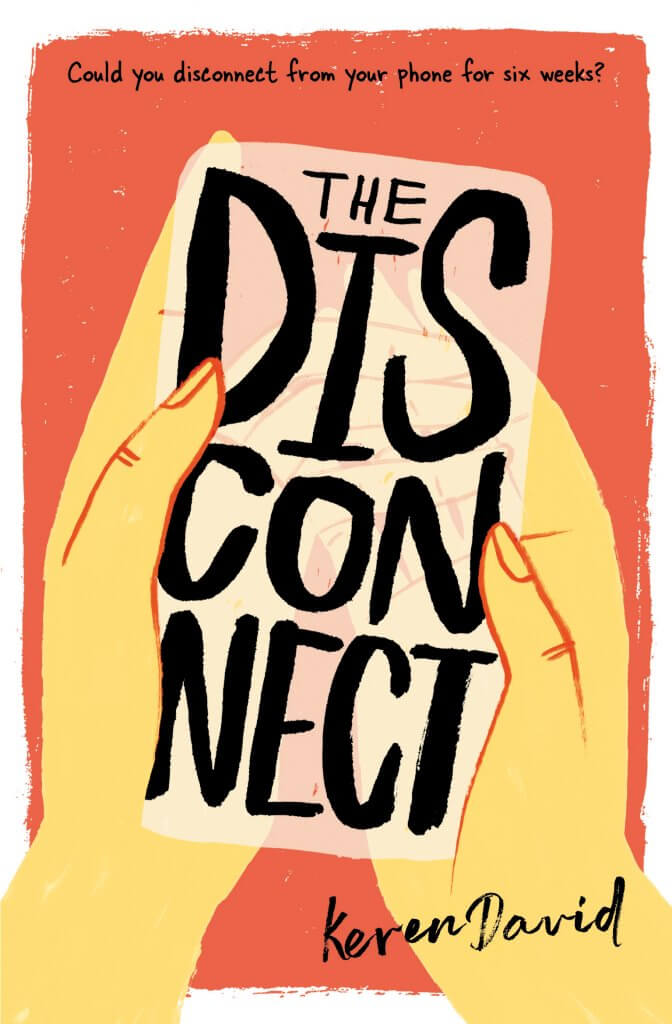
Barrington Stoke (my old faves) very kindly sent me a copy of The Disconnect, Keren David’s next novella for them, to review.
How will a group of teenagers react when they are offered £1,000 to give up their mobile phone in Keren David’s thought-provoking story of perspective and influence.When an eccentric entrepreneur challenges a class to give up their phones, offering a prize of £1,000 to the one who lasts the longest, Esther is determined to win. But ignoring the draw of technology is difficult and it’s not as easy as she thought to resist that niggling urge. Can she hold out long enough to win the money and what else can Esther and her friends discover when they’re not glued to their screens? An astute and enthralling examination of the highs and lows of social-media life, from one of the most compelling voices in teenage fiction
As usual for a Barrington Stoke title, it says a lot with a few words. What I loved about this book, was that it wasn’t telling teenagers to get off their phones altogether but that perhaps it is worth looking up occasionally…and that parents and other adults are as guilty as teens about overusing their screens! In fact, I enjoyed it so much that I pestered Keren for the Third Degree…
Hi Keren, welcome to TeenLibrarian and thank you for giving up your time to undergo the third degree!
What prompted you to write about mobile phone use?
It’s such a huge thing in teenagers’ lives – all of our lives – and I thought it would be good to think about all the things, good and bad that we get from our phones. It’s something that I talk to my children about a lot. And I’d also been talking to a friend whose daughter was being bullied, and a lot of that was happening within Snapchat groups. I had a long talk with my son to work out what might actually tempt teenagers to put down their phones – money, we concluded.
Do you have any advice for teens that might be worried about social media ruling their lives?
Give yourself a break. Even switching off once a week for 24 hours can put things into proportion, and help you create a sense of yourself that is separate from social media.
The descriptions of food were wonderful, what inspired Basabousa?
On a very superficial level, I love Middle Eastern food and enjoy going to restaurants where it is served. On a deeper level, at a time of growing antisemitism, I wanted to create a benign character who is Israeli but whose family is originally from an Arab land – as they tend to get ignored in the overheated political narrative.
This isn’t your first title for Barrington Stoke, how did you first get involved with them?
I loved their mission and books, and wanted to write for them for a long time. Then I had a letter from a dyslexic boy who said he’d enjoyed my books. So my agent used it as a way to approach Barrington Stoke, and luckily they were keen for me to write for them.
Is writing a novella a very different process to writing a longer novel?
It’s similar but much more concise – no time to dwell on minor characters or sub-plots. I like it!
If you go into schools, do you prefer writing workshops or author talks?
I’m equally happy to do either. With writing workshops I try and do something that is fun, because I feel that often the enjoyment is sucked out of writing at school. I do one exercise where pupils create characters, then work in pairs to bring those characters together into a plot. Then – after a lot of laughing and excitement – I tell them that’s how my first book started, by doing that very exercise in a creative writing class.
What are you currently reading and who would you recommend it to?
I’ve just finished Tracey Thorn’s memoir Another Planet: A Teenager in Surburbia (Canongate) which was an extraordinary read for me, as Tracey and I were in the same class at school and did all the same A levels. A lot of it felt like reading my teenage diaries. I’d recommend it to anyone, but especially those of us who were teens in the late 70s. And I’ve just started reading Karen’s McCombie’s Little Bird Flies (Nosy Crow) which is an absolutely beautiful, emotionally gut-wrenching story, perfect for sensitive 10 to 14 year olds.
What are you hoping 2019 will bring?
I’ve just started work on a new book, so I hope that’ll be a good experience!
The Disconnect is out on 15th April 2019
I’m always in the market for new Barrington Stoke books so thanks for the in-depth review and interview.